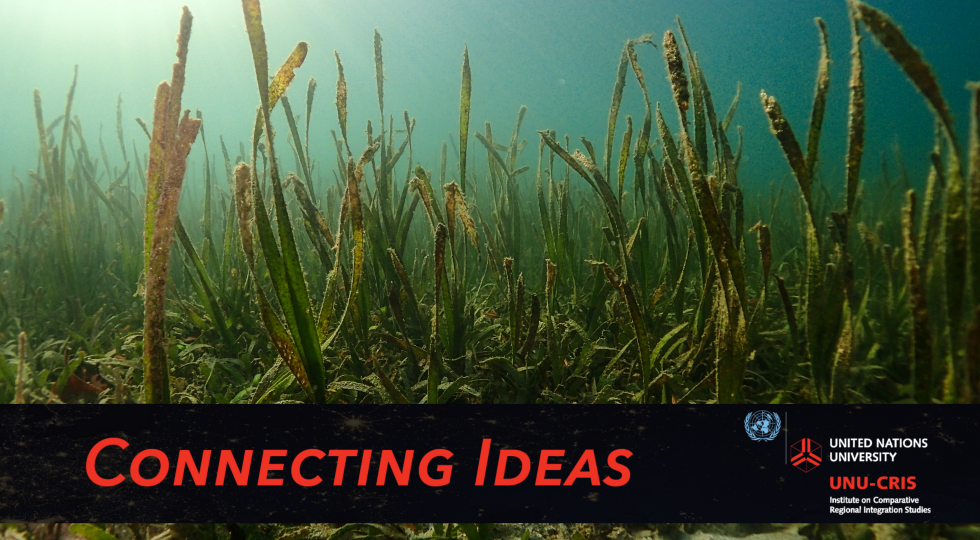Further Action on Biosecurity Needed to Safeguard the Global Seaweed Industry


Elizabeth Cottier-Cook
Head, United Nations University Associate Institute, Scottish Association for Marine Science (SAMS)

Nidhi Nagabhatla
Senior Research Fellow, UNU-CRIS

Louise Shaxson
Senior Research Associate, Overseas Development Institute (ODI)
10 January 2022 | #22.01 | The views expressed in this post are those of the author and may not reflect those of UNU-CRIS.
This blog was originally published by the International Science Council.
Seaweed cultivation is the most rapidly expanding sector in aquaculture production, accounting for more than 50 percent of total global marine production, equating to around 34.7 million tonnes. With seafood increasingly used for food (and animal feed), as well as in fertilisers, food supplements, and even alternatives to plastics, the industry has grown rapidly in the past 50 years, reaching a value of US$14.7 billion in 2019. The seaweed cultivation industry supports the livelihoods of over 6 million small-scale farmers and processors, many of whom are women, predominantly in low and middle-income countries. However, the rapid expansion of the industry has taken place in tandem with increasing pressures from warming seas caused by climate change and an over-reliance on certain species, which has seen the industry ravaged by pests and diseases.
“Coastal communities in low to middle income countries have come to rely on seaweed farming for their livelihoods, but we are already seeing the detrimental impacts due to lack of biosecurity protocols on this industry.”
- Elizabeth Cottier-Cook, Scottish Association for Marine Science (SAMS), Scotland.
A recently published policy brief written by an international expert team highlights key recommendations to ensure the long-term sustainability of the growing global seaweed industry and its role in providing nature-based solutions within the sustainable ocean economy agenda and in contributing to the UN Decade of Ocean Science for Sustainable Development (2021 – 2030).
The authors, who are based at 30 institutions across 18 countries, have collectively outlined a message for creating sustainable value chains, inclusive production systems, and gender balanced policies for the rapidly expanding seaweed industry, based around eight key recommendations. The recommendations are a call for action to support technological innovation, capacity building, and effective gender-responsive and coordinated policies, incentives, and regulations:
- Develop clear international policies and regulations
- Develop regional and national capacity building initiatives, which are gender-responsive
- Develop regional and national seed stocks and biosecurity nurseries
- Maintain the genetic diversity in wildstock
- Advance assessment tools for balancing the associated environmental risks with potential benefits
- Incentivise integration of seaweed with other fed-aquaculture species and with other maritime activities
- Channel support for long-term investment in promoting the beneficial aspects of the industry
- Establish a network of Regional Seaweed Research Networks

Addressing Biosecurity for Long-term Sustainability of the Seaweed Industry
All contributing experts collectively recommended that for future sustainability, improvements are urgently needed in biosecurity and traceability, pest and disease identification and outbreak reporting, risk analysis to prevent transboundary spread, the establishment of high quality, disease-free seedbanks and nurseries, and the conservation of genetic diversity in wild stocks.
Epidemics such as SARS – and, more recently, COVID-19 – are increasingly considered as international security issues and have intensified the need for increased awareness of biosecurity at levels. This includes food or biosecurity, and the concept of protecting food/production systems from land and water from biological hazards. The recommendation on boosting biosecurity aims to minimize the risk of pest and disease outbreaks and to mitigate adverse impacts, thus protecting public health, ensuring the sustainability of the industry, and safeguarding the environment.
Biosecurity needs to be incorporated into government policies and regulations, as well as farm operational plans. In the context of the Progressive Management Pathway for Improving Aquaculture Biosecurity (PMP/AB), a new initiative of the Food and Agriculture Organization of the United Nations (FAO) and partners, biosecurity refers to the cost-effective management of risks posed by pathogenic agents to aquaculture through a strategic approach at enterprise, national and international levels with shared public-private responsibilities.
The GlobalSeaweedSTAR (GSSTAR) programme established substantial evidence that improvements in biosecurity, pathogen identification, and reporting systems, the establishment of seed banks and nurseries to reduce the dependence on imports, and the conservation of genetic diversity in wild stocks are urgently required if the seaweed industry is to prosper. Consequently, a Progressive Management Pathway (PMP) specifically designed for seaweed biosecurity (PMP/AB-Seaweed) has been developed by the GSSTAR team to guide stakeholders from farmers to governmental agencies and NGOs in how to respond to – and contain – emerging exotic and endemic pest and disease outbreaks. This pathway needs to be implemented at the national level in combination with the establishment of incentives, policies, and capacity building initiatives, which protect livelihoods, are gender-responsive and increase resilience – particularly of small-scale farmers and processors and the wider environment – to the impacts of climate change and the globalisation of this industry. In addition, the project interface offers the Biosecurity Policy Database, a collection of policies relevant to the seaweed industry internationally, and specifically for top seaweed-producing countries.
As high-level sustainability fora and meetings, like the recent COP 26, debate solutions to cut emissions, one suggestion has been to feed seaweed to farm animals in a bid to slash methane emissions by at least 30%. With growing interest in seeking multiple and diverse uses of seaweeds, it is important that all stakeholders seeking to invest, grow or create value chains in this rapidly emerging industry have access to evidence-backed sustainable production guidelines and recommendations. We propose that a bio secure seaweed industry will require the collaboration and cooperation of scientists, technology experts, policymakers, law, and policy administration officials and – above all – strengthening the capacity of communities and people involved in production systems. Supporting this need, our work in selected nations and regions is supporting the roadmap for science-policy interfacing and the creation of sustainable value chains for the seaweed industry.
